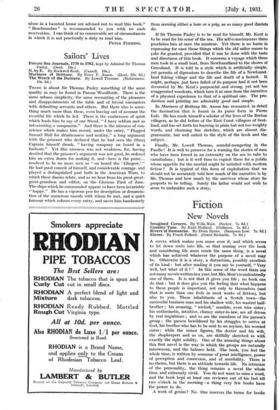Sailors' Lives
N. by E. By Rockwell Kent. (Cassell. 166.)
THERE is about Sir Thomas Pasley something of the same quality as may be found in Parson Woodforde. There is the same urbane simplicity, the same recounting of the pleasures and disappointments of the table and of trivial encounters with defaulting servants and others. But there also is some- thing much more than these, even leaving out of account the eventful life which he led. There is the exuberance of spirit which leads him to say of one friend, "I have seldom met so intoxicating a companion." And there is the niceness of con- science which makes him record, under the entry, "Flogged Samuel Hall for drunkenness and mutiny," a long argument with the prisoner who declared that he had seen the (then) Captain himself drunk, "having company on board in a harbour." Yet this niceness was not weakness, for, having decided that the prisoner's argument was not good, he ordered him an extra dozen for making it, and—here is the point—. resolved to be no more seen so "oil board the ' Glasgow.' " He had good conceit of himself, and considerable courage, and played a distinguished part both in the American Wars, to which these diaries relate, and as we hear from his great-great- great-grandson and editor, on the Glorious Firbt. of June.
The ships which he commanded appear to have been invariably happy." He has a vigorous pen for description or denuncia- tion of the numerous rascals with whom he met, and a quiet humour which colours every entry, and saves him handsomely from seething either a bore or a prig, as so many good diarists do.
If Sir Thomas Pasley is to be read for himself, Mr. Kent is to be read for his sense of the sea. His self-consciousness there proclaims him at once the amateur. Yet there is no harm in expressing for once those things which the old sailor comes to take for granted, provided that it can be done with the taste and directness of this book. It concerns a voyage which three men took in a small boat, from Newfoundland to the shores of Greenland. It is told in a style which is artificially simple, yet permits of digressions to describe the life of a Newfound- land fishing village and the life and death of a hermit. It might, perhaps, just have failed of its purpose had it not been decorated by Mr. Kent's purposeful and strong, yet not too exaggerated woodcuts, which turn it at once from the narrative of a physical experience to that of a spiritual one. The pro- duction and printing are admirably good and simple.
In Mariners of Brittany Mr. Anson has recounted in detail the fascination that is found in its purer form in Pierre Loti. He has made himself a scholar of the lives of the Breton villagers, as he did before of the East Coast villagers of Scot- land, and has set forth his learning in plain but not too weighty words, and charming line sketches, which are almost dia- grammatic, but well suited to the style of the book and the subject.
Finally, Mr. Lowell Thomas, scandal-mongering in the Pacific! It is well to preserve for a warning the stories of men who have been forced in an extremity on the sea to take to cannibalism ; but is it well thus to exploit them for a public whose appetite for the morbid might be satisfied with modern fiction ? It is typical of this form of exploitation that we should not be accurately told how much of the narrative is by Mr. Thomas and how much by the survivor whose story he purports to be telling. Surely the latter would not wish to seem to embroider such a story.










































 Previous page
Previous page